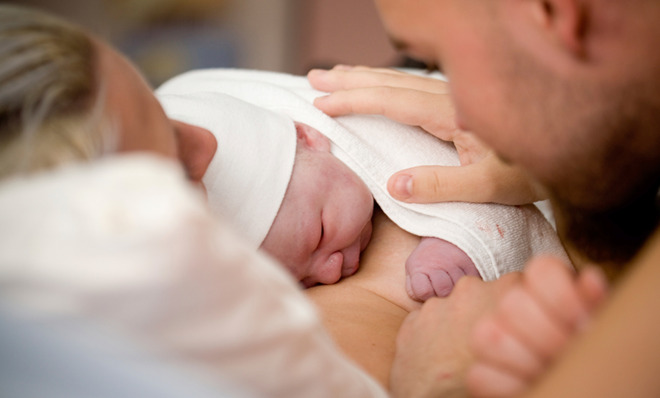The cult of natural childbirth has gone too far
It's childbirth, not performance art


A free daily email with the biggest news stories of the day – and the best features from TheWeek.com
You are now subscribed
Your newsletter sign-up was successful
I wasn't planning on having a birth story. During my pregnancy, I used all the extra energy I could summon to resist the Brooklyn birthing culture that calls forgoing pain medication "natural" and embraces doulas, midwives, bathtubs, and birthing centers. When my doctor asked me what my birthing plan was I told her I was looking at it.
She was the one who went to school for this, the one who had done this hundreds of times. I wanted to have the baby and get on with it; my son would be the story, not how I got him out. If it wasn't for the fact that my water broke the day after Hurricane Sandy swept through New York City, shutting down all but one local hospital, I would have succeeded. In the end, I found myself in an overcrowded hospital with an exhausted and ill-prepared staff. The waiting room was crowded with moaning women on the brink, but once I got admitted it was eerily quiet, with only one doctor and a handful of nurses overseeing a hallway’s worth of deliveries. We all made it through okay — but it wasn't pleasant or "natural," and that wasn't the point.
The Lifetime network just announced that they will begin production on Born Into the Wild, a new show which will feature women giving birth unassisted in the great outdoors. Yes, even doulas and midwives are too much interference, too unnatural, for these women. The press release for the new series explains that it will explore "what happens when the craziest experience of a woman's life becomes truly wild."
The Week
Escape your echo chamber. Get the facts behind the news, plus analysis from multiple perspectives.

Sign up for The Week's Free Newsletters
From our morning news briefing to a weekly Good News Newsletter, get the best of The Week delivered directly to your inbox.
From our morning news briefing to a weekly Good News Newsletter, get the best of The Week delivered directly to your inbox.
As extreme as it may sound, the show is, believe it or not, a natural extension of a culture that has turned labor into a defining moment in women's lives, their first chance to prove just how devoted a mother they truly are. The criteria for measuring this devotion are based on how little medical intervention they use during labor, meaning the ultimate mama, the sort who might appear in this new show, is one who relies only on her breath, the shade of a couple of pine trees, and a kiddie pool on top of a bed of leaves to get her baby out in the most natural method imaginable. On the losing end of the spectrum, we'd see a C-section mother, who broke every alternative birthing commandment imaginable by electing to undergo the procedure. According to this dubious line of thinking, she will pay for that surgery with a less attached, less bacterially diverse baby.
While this natural birthing culture has yet to convince the vast majority of American to do without MDs and hospitals, it has contributed to the culture of guilt that continues to wind itself around parenthood, squeezing mothers before they even hold their child. (Jennifer Senior's excellent parenthood book All Joy and No Fun didn't make its way onto best-seller lists because we are all doing fine.) Epidurals, which there is not a convincing medical reason to avoid, have taken on an aura of shame. Women I know — and even their husbands — contemplate forgoing the procedure for no better reason than that the culture around them says it's the right thing to do.
Celebrities have caught the bug too. Jessica Alba and Gisele Bundchen have sung the praises of natural birth, and Mila Kunis recently told Ellen DeGeneres that she is not going to have an epidural because "I did this to myself, I might as well just do it right. I wanted this!" As if mothers who get epidurals don't want their babies? Or having pain medication is doing it wrong? (Correct answer: Mothers who use epidurals want their babies, too, and there is nothing wrong with using one. In fact, back in the early 20th century feminists fought hard for such pain relief — it can be considered progress!)
But the most frustrating part of both the television show and the alternative birthing culture is the way they reflect the two-tier medical system in this country. The women who will give birth on Born Into the Wild will have a team of medical professionals on call at the production site, just in case something goes wrong. This is not meaningfully different than the way wealthier women choose an alternative birthing option in the shadow of top hospitals where they can seek help if necessary. As for those sad statistics about the relatively high rates of maternal and infant mortality in the States, that is more a reflection of the subpar prenatal care received by working class Americans rather than the inherent ills of the medical system.
A free daily email with the biggest news stories of the day – and the best features from TheWeek.com
If you’ve seen the Mad Men episode in which Betty gives birth, you know what prompted women to start an alternative birthing moment back in the 1960s. In the episode, she is treated with no respect by her doctors, shaved, given an enema, knocked out for the delivery with madness-inducing drugs, and denied the company of her husband. So yes, it’s wonderful that women have achieved more control over what happens during delivery than was the case in the '60s.
But somewhere along the way, the movement to reform how we give birth became one that only wealthy women like Alba, Bundchen, and Kunis have access to — the very women who are statistically very unlikely to suffer from the complications they say they want to avoid. To make giving birth a better and safer experience for all women, I have much more hope in ObamaCare — which is making maternity care standard (previously only 12 percent of plans sold in the individual market covered it) — than in all the breathing techniques in the world.
In the meantime, if a TV producer really wants to show what it is like to give birth in a difficult setting, why don't they follow the labor of an uninsured women making minimum wage whose local hospital is not local, well-staffed, or state-of-the-art? Now she will have some really wild obstacles to overcome.
Elissa Strauss writes about the intersection of gender and culture for TheWeek.com. She also writes regularly for Elle.com and the Jewish Daily Forward, where she is a weekly columnist.
-
 Political cartoons for February 16
Political cartoons for February 16Cartoons Monday’s political cartoons include President's Day, a valentine from the Epstein files, and more
-
 Regent Hong Kong: a tranquil haven with a prime waterfront spot
Regent Hong Kong: a tranquil haven with a prime waterfront spotThe Week Recommends The trendy hotel recently underwent an extensive two-year revamp
-
 The problem with diagnosing profound autism
The problem with diagnosing profound autismThe Explainer Experts are reconsidering the idea of autism as a spectrum, which could impact diagnoses and policy making for the condition
